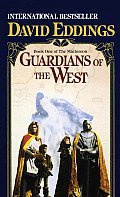
| Series: | The Malloreon #1 |
| Publisher: | Del Rey |
| Copyright: | April 1987 |
| Printing: | October 1991 |
| ISBN: | 0-345-35266-1 |
| Format: | Mass market |
| Pages: | 438 |
Technically speaking, many things in this review are mild spoilers for the outcome of The Belgariad, the previous series set in this world. I'm not going to try to avoid that because I think most fantasy readers will assume, and be unsurprised by, various obvious properties of the ending of that type of epic fantasy.
The world has been saved, Garion is learning to be king (and navigate his domestic life, but more on that in a moment), and Errand goes home with Belgarath and Polgara to live the idyllic country life of the child he never was. That lasts a surprisingly long way into the book, with only occasional foreshadowing, before the voice in Garion's head chimes in again, new cryptic prophecies are discovered, and the world is once again in peril.
I can hear some of you already wondering what I'm doing. Yes, after re-reading The Belgariad, I'm re-reading The Malloreon. Yes, this means I'm arguably reading the same series four times. I was going through the process of quitting my job and wrapping up projects and was stressed out of my mind and wanted something utterly predictable and unchallenging that I could just read and enjoy without thinking about. A re-read of Eddings felt perfect for that, and it was.
The Malloreon is somewhat notorious in the world of epic fantasy because the plot... well, I won't say it's the same plot as The Belgariad, although some would, but it has eerie similarities. The overarching plot of The Belgariad is the battle between the Child of Light and the Child of Dark, resolved at the end of Enchanters' End Game. The kickoff of the plot of The Malloreon near the middle of this book is essentially "whoops, there was another prophecy and you have to do this all again." The similarities don't stop there: There's a list of named figures who have to go on the plot journey that's only slightly different from the first series, a mysterious dark figure steals something important to kick off the plot, and of course there is the same "free peoples of the west" versus "dictatorial hordes of the east" basic political structure. (If you're not interested in more of that in your fantasy, I don't blame you a bit and Eddings is not the author to reach for.)
That said, I've always had a soft spot for this series. We've gotten past the introduction of characters and gotten to know an entertaining variety of caricatures, Eddings writes moderately amusing banter, and the characters can be fun if you treat them like talking animals built around specific character traits. Guardians of the West moves faster and is less frustrating than Pawn of Prophecy by far. It also has a great opening section where Errand, rather than Garion, is the viewpoint character.
Errand is possibly my favorite character in this series because he takes the plot about as seriously as I do. He's fearless and calm in the face of whatever is happening, which his adult guardians attribute to his lack of understanding of danger, but which I attribute to him being the only character in the book who realizes that the plot is absurd and pre-ordained and there's no reason to get so worked up about it. He also has a casual, off-hand way of revealing that he has untapped plot-destroying magical powers, which for some reason I find hilarious. I wish the whole book were told from Errand's point of view.
Sadly, two-thirds of it returns to Garion. That part isn't bad, exactly, but it features more of his incredibly awkward and stereotyped relationship with Ce'Nedra, some painful and obvious stupidity around their attempt to have a child, and possibly the stupidest childbirth scene I've ever seen. (Eddings is aiming for humorous in a way that didn't work for me at all.) That's followed by a small war (against conservative religious fanatics; Eddings's interactions with cultural politics are odd and complicated) that wasn't that interesting.
That said, the dry voice in Garion's head was one of my favorite characters in the first series and that's even more true here when he starts speaking again. I like some of what Eddings is doing with prophecy and how it interacts with the plot. I'm also endlessly amused when the plot is pushed forward by various forces telling the main characters what to do next. Normally this is a sign of lazy writing and poor plotting, but Eddings is so delightfully straightforward about it that it becomes oddly metafictional and, at least for me, kind of fun. And more of Errand is always enjoyable.
I can't recommend this series (or Eddings in general). I like it for idiosyncratic reasons and can't defend it as great writing. There are a lot of race-based characterization, sexism, and unconsidered geographic stereotypes (when you lay the world map over a map of Europe, the racism is, uh, kind of blatant, even though Eddings makes relatively even-handed fun of everyone), and while you could say the same for Tolkien, Eddings is not remotely at Tolkien levels of writing in compensation. But Guardians of the West did exactly what I wanted from it when I picked it up, and now part of me wants to finish my re-read, so you may be hearing about the rest of the series.
Followed by King of the Murgos.
Reviewed: 2020-01-11